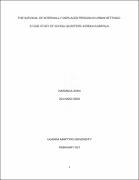The survival of internally displaced persons in urban settings
Abstract
This study looks at the survival techniques of internally displaced persons within the urban setting
having often been left out by the government and most NGOs considering them as person who
have obtained a durable solution compared to their counterparts in the rural camp setting who have
identification and are regarded and catered for by the government and most NGOs.
IDPs often times face many challenges especially with their survival since they have to toil a lot
in order to fend for themselves and their families. The situation worsens when it gets to IDPs in
the urban setting. This makes them more vulnerable, they get involved in risky low paying jobs;
they are overworked and paid little. They live in poor conditions often times live in slums which
are congested with poor drainage systems and poor disposal of human waste and rubbish. Poor
accommodation and feeding is not to standard. They often afford one meal per day regardless
either a child or an old person and cheap food with no balanced diet.
Most IDPs indicated most of the constrains being financial, housing, unemployment, the type of
work stone quarrying having left permanent marks on their bodies in form of deformation and
affording one meal per day.
The different coping strategies included buying cheap foods and having one meal per day, secondly
buying cheap second hand clothes and thirdly having strong networking system with kinships and
village mates.
Urban IDPs would wish to return home but are not ready to return why? And to what extent has
government interventions been successful regarding the returning process of Urban IDPs. It ever
tried returning the IDPs of Acholi quarter but all are back in Acholi quarter implying there is need
to research on why the “Returnees” of Acholi quarter are back to Acholi quarters again yet the
conditions of living are still poor


